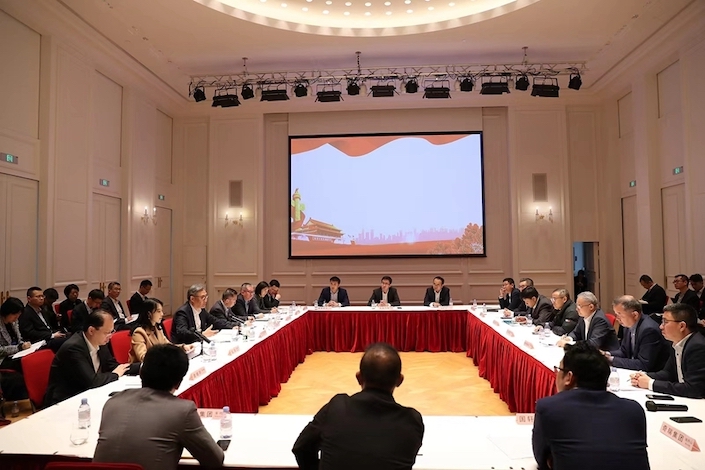Commerce Minister Calls Claims About China’s EV Overcapacity ‘Groundless’
Listen to the full version

China’s Minister of Commerce defended the country’s electric vehicle industry against accusations of unfair subsidies, stressing that technological innovation, a sound supply chain and full competition are the true drivers of growth.
Wang Wentao made the comments Sunday in Paris at a roundtable meeting with Chinese EV enterprises in Europe, calling the accusations from the United States and European Union that China’s overcapacity in the EV industry benefited from excessive state subsidies “groundless.”

Unlock exclusive discounts with a Caixin group subscription — ideal for teams and organizations.
Subscribe to both Caixin Global and The Wall Street Journal — for the price of one.
- DIGEST HUB
- China's Minister of Commerce, Wang Wentao, defended the Chinese electric vehicle (EV) industry against accusations of unfair subsidies by the U.S. and EU, attributing the industry's growth to innovation and robust supply chains rather than state support.
- The EU has launched an anti-subsidy investigation targeting major Chinese EV makers like BYD Co. Ltd., and is considering imposing additional tariffs based on findings that Chinese EVs benefit from government subsidies, making them cheaper than European counterparts.
- Amidst growing international scrutiny and potential new tariffs, Wang urged Chinese automakers to focus on innovation, risk management, and deeper cooperation with local partners in their overseas expansions.
China's Minister of Commerce, Wang Wentao, has defended the Chinese electric vehicle (EV) industry against claims of unfair state subsidies, attributing the industry's growth to technological innovation, robust supply chains, and competitive practices rather than governmental support [para. 1][para. 2]. During a roundtable in Paris with Chinese EV companies operating in Europe, Wang dismissed accusations from the U.S. and EU as baseless. These allegations have been particularly pronounced since the EU launched an anti-subsidy investigation targeting major Chinese automakers like BYD Co., Zhejiang Geely Holding Group, and SAIC Motor Corp [para. 2][para. 3].
Wang criticized the EU’s protectionist measures and called for a fair assessment of China's industrial activities. He emphasized that global trade dynamics and supply chain developments often misinterpret overcapacity issues [para. 4]. With impending EU decisions on tariffs that could affect Chinese EVs, Wang urged Chinese firms to focus more on innovation and risk management to navigate potential market challenges effectively [para. 4][para. 5].
Despite these challenges, Chinese EV manufacturers are not slowing down their expansion in Europe; companies like SAIC and BYD are even establishing local manufacturing bases [para. 5]. Wang advised these companies to enhance their risk management strategies and seek deeper collaboration with European partners to mitigate potential impacts from regulatory changes [para. 6].
An executive from one of the involved Chinese automakers anticipates that the outcome of the EU’s investigation might be announced soon, possibly leading to new tariffs. However, there is hope that diplomatic negotiations might reduce these rates [para. 7]. Recently, the EU found substantial evidence suggesting that Chinese EV imports benefited from various subsidies such as direct fund transfers and tax breaks which led them to initiate registration of these imports for possible retrospective tariff imposition [para. 8].
The European Parliament reported that subsidies allow Chinese-made EVs to be priced around 20% lower than comparable European models. This price advantage is linked to an excess in battery supply and production capacity within China [para. 9]. Meanwhile, in the U.S., restrictive measures have been implemented under which American buyers can receive significant tax credits for purchasing EVs unless they contain batteries made in China. Additionally, concerns over national security have prompted a U.S. investigation into smart cars from China due to fears they could collect sensitive data [para. 10][para. 11].
Overall, while facing international scrutiny and potential new tariffs, China’s EV sector continues its global market penetration efforts by emphasizing innovation and strategic partnerships while navigating evolving regulatory landscapes in key markets like Europe and America.
- BYD Co. Ltd.
- BYD Co. Ltd. is one of China's largest car manufacturers and is currently targeted by the EU's anti-subsidy investigation, which was launched last October. This investigation accuses Chinese EV makers, including BYD, of benefiting from excessive state subsidies. Despite these challenges, BYD is actively expanding its presence in Europe by establishing local manufacturing facilities to strengthen its position in the global market.
- Zhejiang Geely Holding Group Co. Ltd.
- Zhejiang Geely Holding Group Co. Ltd. is one of China's largest car makers and is currently targeted by the EU’s anti-subsidy investigation launched last October. This investigation focuses on allegations that Chinese electric vehicle (EV) manufacturers, including Geely, have benefited from excessive state subsidies, contributing to their competitive pricing in global markets.
- SAIC Motor Corp. Ltd.
- SAIC Motor Corp. Ltd. is one of China's largest car makers and is currently under scrutiny as part of the EU’s anti-subsidy investigation targeting Chinese EV manufacturers. The company is proactively expanding its presence in Europe by establishing local manufacturing facilities, despite facing potential challenges from additional tariffs that could be imposed following the EU's investigation results expected later this year.
- MOST POPULAR






